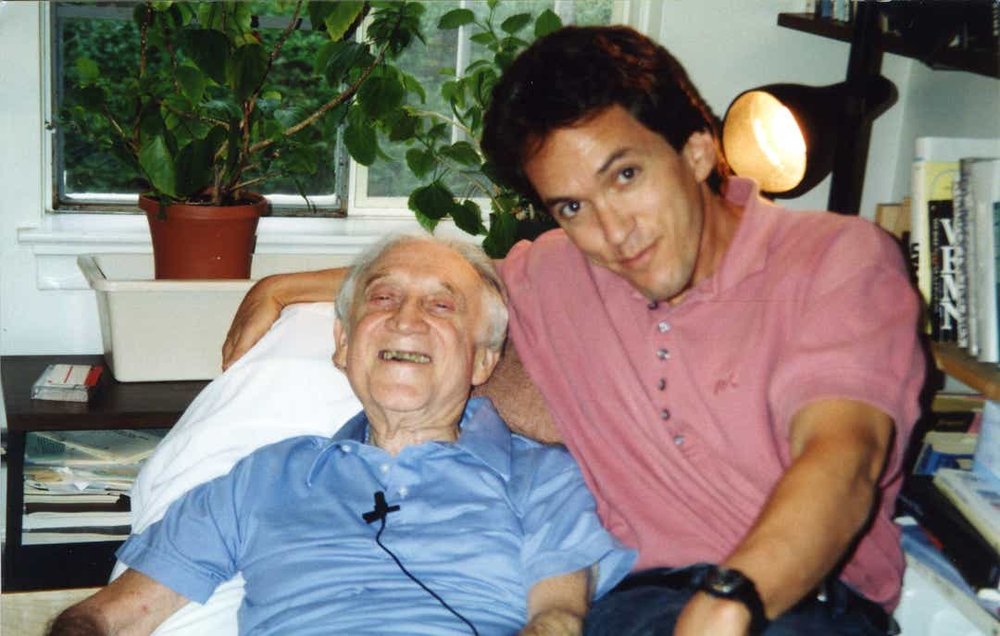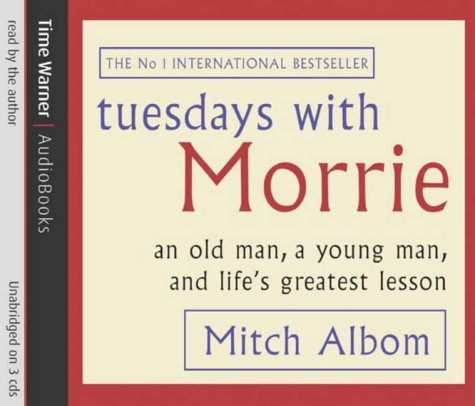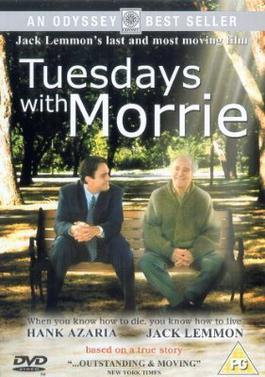
Mitch Albom and Morrie.- Photo credit Detroit Free Press
“The most important thing in life is to learn how to give out love, and to let it come in.”
It was over twenty years ago: we were in Canada visiting family and friends in Niagara Falls and Toronto, where I first discovered “Tuesdays with Morrie”. To be precise, we were at my sister’s house in Oshawa, talking and discussing till late at night, when my sister said, “Kamran you must read Tuesdays with Morrie: its all about an old professor and his former student”. This, for obvious reasons, caught my attention and imagination. At the time I was a senior lecturer in economics at Coventry University.
The next day, I recall, my wife and I went to Chapters Book Store and purchased the book.
We got back home to England and I began to read the book. I found it fascinating. Here was a book on life’s big picture and the vital questions: Who am I? Where have I come from? Where am I going? What is the meaning of life? What is wisdom? What is good life? What is happiness? What is dying and death? What is joy? What is pain and sadness?...
“Tuesdays with Morrie” has never left me. Yes, I moved on, put the book on one side and no doubt compromised. But, last night I rediscovered “Tuesdays with Morrie” once again.
My wife and I were searching through our DVDs to find something nice to watch, when we saw “Tuesdays with Morrie”, a film starring Hank Azaria and Jack Lemmon. What can I say but what a fantastic movie, what a brilliant true story.
I realise that its insights are more relevant than ever. Wisdom, maturity, and happiness seem to go hand in hand with figuring out what life is all about and how we may live it.
“Maybe it was a grandparent, or a teacher, or a colleague. Someone older, patient and wise, who understood you when you were young and searching, helped you see the world as a more profound place, gave you sound advice to help you make your way through it.
For Mitch Albom, that person was Morrie Schwartz, his college professor from nearly twenty years ago.
Maybe, like Mitch, you lost track of this mentor as you made your way, and the insights faded, and the world seemed colder. Wouldn't you like to see that person again, ask the bigger questions that still haunt you, receive wisdom for your busy life today the way you once did when you were younger?
Mitch Albom had that second chance. He rediscovered Morrie in the last months of the older man's life. Knowing he was dying, Morrie visited with Mitch in his study every Tuesday, just as they used to back in college. Their rekindled relationship turned into one final "class": lessons in how to live.
Tuesdays with Morrie is a magical chronicle of their time together, through which Mitch shares Morrie's lasting gift with the world. Now the best-selling memoir of all time, Tuesdays with Morrie began as a modest labor of love to help pay some of Schwartz’s medical bills. Today, the book has sold more than 15 million copies in more than 50 editions around the world.”
Life Lessons From Tuesdays With Morrie (Doubleday, 1997)

To summarise Morrie’s thinking on wisdom, life, living and dying:
1. “Accept what you are able to do and what you are not able to do.” (p. 18)
2. “Accept the past as past, without denying it or discarding it.” (p. 18)
3. “Learn to forgive yourself and to forgive others.” (p. 18)
4. “Don’t assume that it is too late to get involved.” (p. 18)
5. Find someone to share your heart, give to your community, be at peace with yourself, try to be as human as you can be. (p. 34)
6. “Love always wins.” (p. 40)
7. “The culture we have does not make people feel good about themselves. And you have to be strong enough to say if the culture doesn’t work, don’t buy it.” (p. 42)
8. “So many people walk around with a meaningless life. They seem half-asleep, even when they’re busy doing things they think are important. This is because they’re chasing the wrong things. The way you get meaning into your life is to devote yourself to loving others, devote yourself to your community around you, and devote yourself to creating something that gives you purpose and meaning.” (p. 43)
9. “. . . if you really want it, then you’ll make your dream happen.” (p. 47)
10. “The most important thing in life is to learn how to give out love, and to let it come in.” (p. 52)
11. “Love is the only rational act.” (p. 52)
12. “I don’t allow myself any more self-pity than that. A little each morning, a few tears, and that’s all . . . . It’s horrible to watch my body slowly wilt away to nothing. But it’s also wonderful because of all the time I get to say goodbye.” (p. 57)
13. “Sometimes you can’t believe what you see; you have to believe what you feel.” (p. 61)
14. “What if today were my last day on earth?” (p. 64)
15. “Once you learn how to die, you learn how to live.” (p. 82)
16. If you accept you are going to die at any time, then you might not be as ambitious as you are. (p. 83)
17. There is no foundation, no secure ground, upon which people may stand today if it isn’t the family. (p. 91)
18. “Don’t cling to things, because everything is impermanent.” (p. 103)
19. “ . . . If you’ve found meaning in your life you don’t want to go back. You want to go forward. You want to see more, do more. You can’t wait until sixty-five.” (p. 118)
20. “Money is not a substitute for tenderness, and power is not a substitute for tenderness.” (p. 125)
21. “ . . . love is how you stay alive, even after you are gone.” (p. 133)
22. “Love each other or perish.” (p. 149)
23. “ . . . the big things—how we think, what we value—those you must choose yourself. You can’t let anyone--or any society—determine those for you.” (p. 155)
24. “Don’t let go too soon, but don’t hang on too long.” (p. 162)
25. “Be compassionate. And take responsibility for each other. If we only learned those lessons, this world would be so much better a place.” (p. 163)
26. “Forgive yourself before you die. Then forgive others.” (p. 164)
27. “As long as we can love each other, and remember the feeling of love we had, we can die without ever really going away. All the love you created is still there. All the memories are still there. You live on—in the hearts of everyone you have touched and nurtured while you were here.” (p. 174)
28. “Death ends a life, not a relationship.” (p. 174)
29. The important questions have to do with love, responsibility, spirituality, awareness. (p. 175)
30. “You’re not a wave, you are part of the ocean.” (p. 180)
31. “. . . there is no such thing as ‘too late’ in life.” (p. 190)
To get to know Morrie and “Tuesdays with Morrie see:
Tuesdays With Morrie | mitchalbom.com
Watch the movie:
Tuesdays With Morrie - YouTube

Morris "Morrie" S. Schwartz (December 20, 1916 – November 4, 1995)
